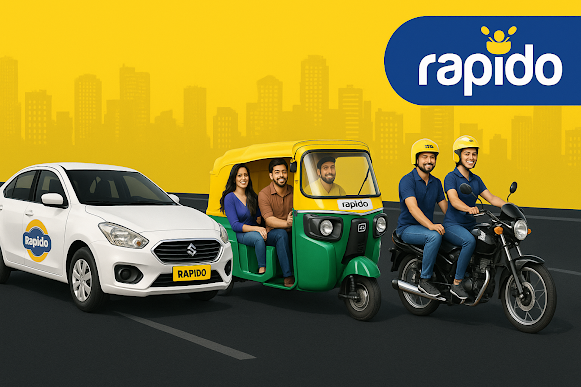The Rapido Startup Story: From Traffic Jams to Unicorn Status
A Spark in the Traffic
In the relentless chaos of
Bangalore’s rush hour, three young men Aravind Sanka, Pavan Guntupalli, and
Rishikesh SR found themselves stuck, not just in traffic, but in the grind of
urban commuting. Each day, they witnessed millions of Indians losing precious
hours to gridlock. This wasn’t just an inconvenience; it was a problem begging
for a solution.
Early Days: TheKarrier and a Pivotal
Pivot
Their entrepreneurial journey began
in 2015, not as a ride-hailing service, but as a B2B logistics provider called
“theKarrier.” The idea was to solve last-mile delivery for businesses. But as
they navigated the logistics landscape, the founders realized the potential for
something bigger. They saw that the true pain point was not just for
businesses, but for everyday people battling city congestion.
The Birth of Rapido
Inspired by the agility of
two-wheelers weaving through traffic, the trio envisioned a platform that would
connect commuters with bike owners for quick, affordable rides. They believed
that two-wheelers could outmaneuver four-wheelers in India’s crowded cities,
making them the perfect solution for short-distance travel.
But the road ahead was not smooth.
Investors were skeptical 75 of them rejected the idea, doubting whether a bike
taxi service could survive against giants like Ola and Uber. Still, the
founders pressed on, fueled by their conviction and the sheer scale of India’s
two-wheeler market over 200 million bikes across the country.
Building Against the Odds
Their persistence paid off when
Pawan Munjal, CEO of Hero MotoCorp, became their first major backer. With this
early support, they launched Rapido in Bangalore in late 2015, starting with a
handful of “captains”—the affectionate term for their riders. The founders
themselves hit the streets, recruiting captains and onboarding early users,
often facing skepticism and logistical hurdles.
The initial days were gritty. The
team was small, resources were tight, and every ride was a victory. Yet, word
spread quickly. Commuters loved the convenience, affordability, and speed. By
the end of the first year, Rapido had over 1,000 captains and had expanded
beyond Bangalore.
Scaling Up and Standing Out
Rapido’s model was unique: instead
of owning vehicles, they empowered everyday bike owners to earn by giving
rides. This asset-light approach allowed rapid scaling. Their mobile app made
booking seamless, and the focus on safety and verification reassured hesitant
users.
As the company grew, so did its
ambitions. Rapido expanded to over 100 cities, amassing a fleet of over 150,000
captains and millions of users. The founders continued to innovate, adding
auto-rickshaw and taxi options, and even pivoting back to logistics during the
COVID-19 pandemic to support local businesses.
Unicorn Status and Beyond
Despite legal and regulatory
challenges in some states, Rapido’s relentless focus on solving real commuter
problems paid off. Backed by major investors like WestBridge, Swiggy, and
Prosus, Rapido hit unicorn status in 2024, valued at over $1.1 billion.
Today, Rapido is not just a bike
taxi app it’s a symbol of what happens when founders listen to the streets,
pivot with courage, and persist through rejection. From the frustration of
Bangalore’s traffic, Rapido’s story is now woven into the fabric of urban
India, helping millions beat the jam every day.
“Each rejection was a lesson, not a
defeat. We knew India needed Rapido, and we weren’t going to stop until we made
it happen.”
Pavan Guntupalli, Co-founder.
Challenges
Faced by Rapido
Regulatory Uncertainty and Legal
Hurdles
From its inception, Rapido grappled with ambiguous or outright restrictive
regulations around bike taxis in many Indian states. In some regions, like
Maharashtra and Karnataka, the company faced bans and legal battles over the
legitimacy of app-based bike and auto services. Navigating this patchwork of
state laws required constant adaptation and legal maneuvering.
Competition and Market Dynamics
Entering a space dominated by giants like Ola and Uber was daunting. New
regional competitors such as Namma Yatri intensified the fight for market
share, especially as these players adapted quickly to local needs and
regulatory climates. Additionally, Rapido had to contend with traditional
auto-rickshaw operators and the informal transport sector, which often resisted
the incursion of app-based services.
Operational and Infrastructure
Challenges
Expanding rapidly to over 100 cities brought logistical hurdles, including
onboarding captains, ensuring ride quality, and maintaining safety standards, In
smaller cities, inadequate infrastructure and limited public transport
integration posed further obstacles, particularly when trying to scale services
like EV fleets and last-mile connectivity.
Financial Pressures
While revenues soared crossing the INR 1,000 crore mark in FY25 profitability
remained elusive for years. Rapido had to manage widening losses, optimize its
cost structure, and diversify its revenue streams through new services like
cabs, auto-rickshaws, and logistics.
Insights
and Lessons Learned
Agility and Adaptation
Rapido’s willingness to pivot from logistics to bike taxis, and later to autos,
cabs, and deliveries was crucial. This flexibility allowed them to survive downturns
like the COVID-19 pandemic and capitalize on emerging opportunities.
Asset-Light Model Drives Scale
By leveraging the existing two-wheeler ecosystem and empowering local bike
owners as “captains,” Rapido scaled quickly without heavy capital investment.
This model proved especially effective in Tier-2 and Tier-3 cities, where
growth outpaced that of major metros.
Ground-Level Understanding
Rapido’s founders maintained close contact with both captains and riders,
ensuring the platform addressed real commuter pain points. This ground-level
awareness helped them build trust and loyalty, even as larger competitors
struggled with dissatisfied drivers and customers.
Diversification is Key
Expanding beyond bike taxis into other mobility and delivery services helped
Rapido buffer against regulatory shocks and market saturation, while also
opening up new revenue streams.
Conclusion:
Rapido in 2025
As of 2025, Rapido stands as a
unicorn, having not only survived but thrived in India’s fiercely competitive
mobility sector. With revenues surpassing INR 1,000 crore and a presence in
over 100 cities, the company has proven its resilience and adaptability. Yet,
the journey is far from over. Rapido now faces the challenge of sustaining
growth, achieving profitability, and navigating an evolving regulatory
landscape all while continuing to innovate for India’s urban commuters. The
next phase will demand even bolder bets, deeper integration with public
transport, and a relentless focus on operational excellence.
MAMEKAMLearning: Empowering the Next Generation of Entrepreneurs
Just as Rapido’s journey shows the power of resilience, adaptability, and ground-level insight, MAMEKAM Learning is dedicated to equipping aspiring entrepreneurs and professionals with the practical skills and mindset needed to thrive in today’s dynamic business landscape. Through immersive, real-world case studies and hands-on learning experiences, MAMEKAM empowers learners to turn challenges into opportunities, innovate with confidence, and build ventures that make a lasting impact. If you’re ready to embark on your own entrepreneurial journey, MAMEKAM Learning is your launchpad to success.
Reference:-
- https://orangeowl.marketing/unicorn-chronicles/rapido-success-story/
- https://en.wikipedia.org/wiki/Rapido_(company)
- https://www.sovrenn.com/knowledge/pavan-guntupalli-from-rejection-to-unicorn-the-inspiring-story-of-rapido-s-co-founder
- https://unicornofindia.com/rapido-success-story/
- https://thirdeyeblindproductions.com/rapido-business-growth-and-marketing-strategies/
- https://thebrandhopper.com/2023/02/21/rapido-founding-story-business-model-growth-marketing-strategies-funding-and-future/
- https://yourstory.com/companies/rapido
- https://www.moneycontrol.com/news/business/startup/rapido-s-ride-through-2024-turning-a-unicorn-expanding-aggressively-and-facing-new-competition-12900274.html
- https://inc42.com/startups/rapido-10-years-decade-1000-cr-revenue-club/
- https://themorningcontext.com/internet/rapido-continues-to-defy-all-odds
- https://www.thehotstartups.com/p/rapido-s-start-up-to-1-1-billion-unicorn-journey
- https://www.ijraset.com/research-paper/challenges-faced-by-rapido-with-special-reference-to-coimbatore-city
- https://www.moneycontrol.com/news/business/startup/rapido-s-ride-through-2024-turning-a-unicorn-expanding-aggressively-and-facing-new-competition-12900274.html
- https://www.ajuniorvc.com/rapido-case-study-startup-story-ola-uber-competition-economics
- https://journals.sagepub.com/doi/10.1177/20438869251325872
- https://www.businesstoday.in/magazine/deep-dive/story/how-rapido-has-disrupted-the-ride-hailing-business-with-its-unique-business-model-and-offerings-412236-2024-01-08








Comments
Post a Comment